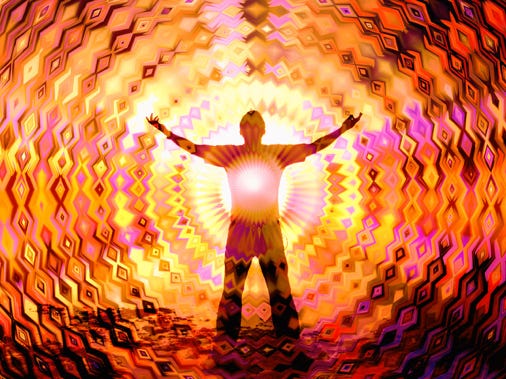Disclaimer: I’m not a medical or mental health professional, so this is not advice. Always do your own research and talk to your own doctor when it comes to mental health.
A primer on Transpersonal Psychology
Transpersonal Psychology, also called “spiritual psychology,” is a lesser-known practice in psychology that may fit a little awkwardly within the scientific community.
It’s essentially psychology, but based on transcendence and connecting with something greater than yourself. Sounds almost religious, really. But it’s intended as a science-leaning approach to mental health based on the thousands of years-worth of self-improvement wisdom and spirituality that have always existed to calm our anxious existence and save us from existential dread.
Its origins lie in ideas touched on by William James, Abraham Maslow, Jung, and others, sprouting off from Humanistic Psychology.
“Transpersonal theory proposes that there are developmental stages beyond the adult ego, which involve experiences of connectedness with phenomena considered outside the boundaries of the ego. In healthy individuals, these developmental stages can engender the highest human qualities, including altruism, creativity, and intuitive wisdom.”
- The Journal of Psychotherapy Practice and Research
Self-transcendence
What is the point of life?
What is the meaning of all this?
We can work ourselves into mental health crises when we think like this and we’re not in the right headspace. But many of us spend decade after decade of our lives trying to figure this out.
Just like religion, the occult and esoteric worlds have claimed to have those answers for us. Believers in a “perennial philosophy” believe that the spiritual traditions found across the world and throughout the epochs, along with mythology, numerology, symbolism, etc. etc. are the same essential teachings, delivered to different people, in different times, and in different packages.
When I read about Transpersonal Psychology, it looks a lot to me like a rebranding of some of the beliefs preached publicly by the secret societies, or in global religion. It’s as if some rogue psychologists saw something useful in the “spiritual awakenings” described by many folks, and thought it could be “bottled up” and used to help people.
You know, the feeling where, at some point in their lives, a person feels content in a way they’ve never felt before, combined with a feeling of connection to nature and other people, or to the whole universe. They’ve left their ego behind, transcending themselves to something ineffable, but feeling more real than anything.
“Everything around me became intensely real. The fields and the bushes and trees and the clouds seemed to be powerfully there, as if an extra dimension had been added to them. They seemed more vivid, more intricate and beautiful. I also felt somehow connected with my surroundings. As I looked up at the sky, I felt somehow the space that fills it was the same ‘space’ filling my own being. What was inside me, as my own consciousness, was also ‘out there.’ And also inside me, there was a glow of intense well-being.”
- Steve Taylor, senior lecturer in psychology at Leeds Beckett University
Awakening experiences
Steve Taylor is a past chair of the Transpersonal Psychology Section of the British Psychological Society. He frequently mentions what he calls “awakening experiences”.
“...the three most common characteristics of the experiences are positive affective states (including a sense of elation or serenity, a lack of fear and anxiety), intensified perception, and a sense of connection (which can be towards other human beings, nature, or the whole universe in general).”
These experiences are often short in duration, but fundamentally change a person for the better.
“Many people described an awakening experience as the most significant moment of their lives, reporting a major change in their perspective on life, and in their values.”
Transpersonal Psychology in practice
“Perhaps the most significant benefits are suggested by reports from advanced meditators about the emergence of deep feelings of peace, joy, and compassion and transcendent states of consciousness, including trans-egoic states of profound unity. Meditative practices have been widely employed for thousands of years by the non-Western wisdom traditions explicitly for this purpose.”
- M. Kasprow, B. Scotton. A Review of Transpersonal Theory and Its Application to the Practice of Psychotherapy
So what would a “session” for Transpersonal Psychology look like? Again, I’m not a professional and I’ve never had this type of therapy. But it appears that a wide range of practices are employed for patients, and many of them aim to induce altered states of consciousness.
So therapeutic practices could include hypnosis, past life therapy, meditation, guided imagery, breathing exercises, and psychedelics.
In this way, you could say that they’re employing healing methods dating back centuries and used by shamans, Buddhists, etc.
Is science becoming more “spiritual?”
Seems like a silly question. But put another way, is society becoming more “spiritual,” by some definition, and thus are certain realms of science simply following societal trends? Or is the other way around and when science delves into experimental territory looking for new solutions, does society then follow suit?
What’s interesting is that there is some evidence of a decline in religion, but a rise in spirituality, at least in the U.S.
“...our surveys do find that the U.S. public overall appears to be growing a bit less religious – but also somewhat more spiritual ... the share of people across a wide variety of religious identities who say they often feel a deep sense of spiritual peace and well-being as well as a deep sense of wonder about the universe has risen.”
- Pew Research Center
Take care of yourselves out there. Til next time,
- Joe





